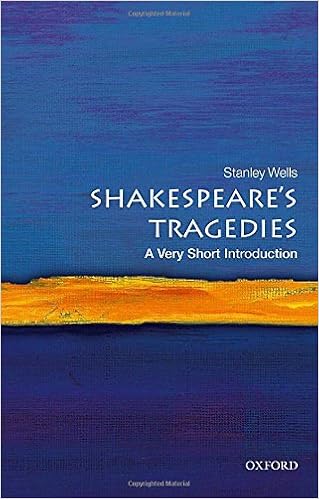
The idea of a quick romp through most of Shakespeare’s greatest plays (give me his tragedies over his comedies any time), requiring no previous scholarly experience of them, strongly appealed, but I was disappointed. It may be that, for all his eminence, Sir Stanley Wells was the wrong choice of author, or perhaps that he was too much constrained by the requirements of the ‘Very Short Introductions’ series: restrict most themes and ideas to three paragraphs at most, and be sure to make space to list and briefly describe filmed versions of the plays – bad as most of them are.
Whatever the constraints, it is surprising that Wells enters upon a discussion of defining Shakespeare’s plays in terms of comedies, histories and tragedies without referring to Shakespeare’s own listing – in Hamlet, through Polonius – ‘tragedy, comedy, history, pastoral, pastoral-comical, historical-pastoral, tragical-historical, tragical-comical-historical-pastoral …’, even though Shakespeare is perhaps there making mock of all the shades of definition.
Wells then draws attention to some of the comedy found in the great tragedies, but makes no specific mention of comic relief, a device (the supreme example of which is the Porter’s scene in Macbeth) that gives the audience a break from the darkest matter of the play, whilst providing a contrast by which the main action of the play is made to seem yet darker.
Wells is repelled by the on- and off-stage mutilation and slaughter in Titus Andronicus, but notes that the play enjoyed great popularity with Elizabethan audiences. He might usefully have made mention of the huge crowds drawn in those times by grisly public executions.
He contrasts Juliet’s ‘accidental’ death with Cleopatra’s, which was ‘self-willed’. Both committed suicide. I have an idea what he is driving at in making the distinction, but think he should have given more thought, and perhaps a little more space, to making his point.
And taking space in this context to single-out for criticism the ‘great literary critic’ Frank Kermode is unnecessary and unconvincing. One suspects professional jealousy.
One hole in the book could perhaps be excused as beyond its remit, but since Wells remarks that Hamlet’s God is Christian, whilst Lear’s gods are pagan – and comments on the late flowering of Roman settings in Shakespeare’s work – I was sorry to find no mention of the 1606 Act to Restrain Abuses, which made it an offence 'in any Stage-play, Interlude, Shew, Maygame, or Pageant, iestingly, and prophanely [to] speake, or vse the holy Name of God, or of Christ Iesus, or of the holy Ghost, or of the Trinitie'. Look at the dates of Hamlet (written around 1600), King Lear (possibly 1606), Antony and Cleopatra (1607) and Coriolanus (1605-1608) and much is explained. Othello (1603) is an interesting hybrid in that by the time it was published in the 1623 Folio its oaths had been softened. Wells quotes a speech from Othello in which Emilia says ‘Ud’s pity’. She is a woman, so might not in any case have been permitted too harsh an oath, but clearly the invocation that is being skirted is ‘God’s pity’.
One of the ‘puffs’ for the Very Short Introduction series reproduced at the front of this volume says that the series ‘must rank by now as a thinking reader’s Wikipedia’. Well, really, you don’t need to be unthinking to gain much from Wikipedia. Looking-up the Wikipedia entries on Shakespeare’s tragedies, selecting the sub-headings that most interest you and following links to, say, the two Romeo and Juliet films, would make an entirely valid alternative to reading this book.
Another virtue of Wikipedia over this book is that where a picture is available in color it is presented in color. The monochrome reproductions in this book of William Salter’s The Death of Desdemona, William Blake’s Pity, George Romney’s mad Lear, and Lawrence Alma-Tadema’s Meeting of Antony and Cleopatra are particularly disappointing. It is not as if this slim, small-format volume is notably cheap.
No comments:
Post a Comment